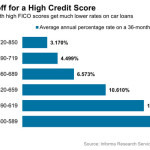 Note: See Part I on FICO Scores, which inspired this question from a reader.
Note: See Part I on FICO Scores, which inspired this question from a reader.
Dear Banker,
I’ve been getting copies of my 3 credit reports annually since 2005.
I’m concerned about a change in the reported information from Capital One and Chase. My reports used to reflect
1) amount billed
2) scheduled (minimum) payment
3) actual payment
The latest reports from Transunion and Experian no longer reflect the “actual payment” amount, so although my reports show all payments made on time, it doesn’t reflect the full balance being paid monthly as opposed to the minimum payment.
I feel like I have to alternate credit cards in order to have a zero balance every other month so it doesn’t appear that I’m making minimum payments and carrying an unpaid balance.
I’ve contacted Capital One and Chase to ask them to report the actual payment amount as they used to, but all I get is a standard response “we’re correctly reporting your account” to the credit bureaus.
Am I wrong in thinking that if they report amounts in addition to whether or not the account is “paid on time”, they should include actual amount paid as well as amount billed?
Thank you
Bette in SA
—
Dear Bette,
Thanks for reading, and for your good question.
The most important element for FICO scoring (35%) is whether bills are paid ‘on time,’ so if you’re consistently doing that, your score will reflect that, and the fact that there’s a balance on your report is (mostly) irrelevant.
The FICO algorithm doesn’t care whether you make minimum monthly payments or full-balance payments. As long as payments are being made ‘as agreed’ according to the fine print you signed with your credit card company, your FICO score can’t distinguish between people who carry a balance and people who pay off their balance every month. What I mean is your score won’t be hurt by minimum monthly payments, nor can you really boost your score by making maximum/full balance payments. There is (almost) no distinction between them, for scoring purposes.
Small caveat: One small part of your score reflects your ‘usage amount,’ meaning what proportion of your available credit balances are used at the time of the score. Meaning, if you had a total of $10,000 in available credit among all your cards, and you were using $9,750 of that with a credit card balance, that could slightly lower your score. Not much, but a little.
Conversely, If you had a total of $10,000 available credit, but only showed up with a monthly balance of say $300 (leaving you with $9,700 available unused credit), that would slightly raise your score. Not much, but a little.

That would be the only sense you could be concerned about the monthly reported balance as you described. However, if you have many thousands in available credit and only hundreds in reported balances, those reported balances are basically irrelevant for your score.
As for you question to Chase and Capital One – I’m sure they won’t change their reporting methods. They just do an automated snapshot on a monthly basis to send to the credit bureaus. On any given day of that snapshot, we (the consumer) may have an outstanding balance on our card, even if we don’t carry any balance month-to-month.
My strong advice – don’t try to alternate card usage, and don’t worry about it, it’s not hurting your credit.
Michael
Please see related Posts
FICO Part I – What’s in the Score?
FICO Part II – Ignoring FICO and also why FICO is awesome
Post read (1151) times.





